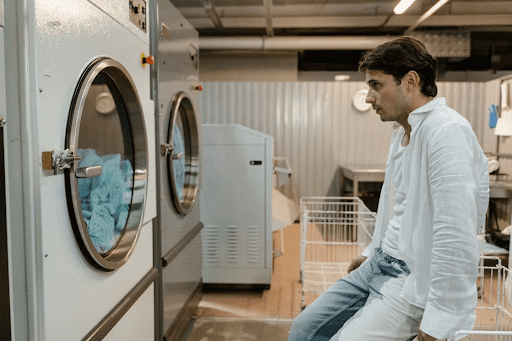Selecting the right commercial dryer is a critical decision for businesses that depend on efficient laundry operations. Whether you run a laundromat, hotel, or healthcare facility, the type of dryer you choose can significantly impact your bottom line, operational workflow, and customer satisfaction. Gas and electric dryers each come with distinct advantages and limitations, making the decision largely dependent on your specific business needs. This blog explores the key differences between gas and electric commercial dryers, comparing their costs, efficiency, maintenance requirements, and safety considerations to help you make the best choice for your business.
Why Choosing the Right Commercial Dryer Matters
Commercial coin operated dryers play an essential role in businesses that rely on clean and dry laundry, such as laundromats, hotels, and healthcare facilities. The right dryer ensures your operations run smoothly and cost-effectively while meeting the demands of your clientele. Choosing the wrong dryer, however, could lead to higher costs, inefficiencies, and unsatisfied customers.
Here’s why this decision is crucial:
- Operational Efficiency: The right dryer ensures faster drying times, minimizing downtime and increasing the number of loads processed daily.
- Cost Management: Choosing a dryer that aligns with your energy source and usage patterns can reduce operational costs over time.
- Customer Satisfaction: Quick turnaround times and well-dried laundry improve customer experiences, particularly in customer-facing businesses like laundromats and hotels.
By understanding the implications of your choice, you can invest in a solution that benefits your business in the long run.
A Quick Overview of Gas and Electric Dryers
Gas and electric dryers serve the same purpose but differ in how they generate heat and the infrastructure they require. The key difference lies in the energy source: gas dryers use natural gas or propane, while electric dryers rely solely on electricity. Both options have specific installation needs and operational characteristics, which we’ll break down further.
Gas Dryers
Gas dryers use natural gas or propane to generate heat for drying laundry. These dryers require a gas line connection and a standard 120-volt electrical outlet to power the drum motor and control panel. Venting is essential to expel combustion gases safely. Gas dryers are known for their high heat output, making them faster at drying loads. However, installation must be handled by professionals to ensure safety and compliance with local regulations.
Electric Dryers
Electric dryers rely on electricity to power both the heating element and the drum motor. They require a 240-volt electrical outlet, which may necessitate upgrading your facility’s electrical system. While electric dryers often take longer to dry laundry, they offer ventless models that provide greater flexibility in placement. Installation is generally simpler than gas dryers, making electric models a popular choice for businesses without existing gas lines.
Comparing Costs: Upfront and Long-Term
The cost of commercial dryers goes beyond the purchase price. You’ll need to consider both the initial investment and the long-term operational expenses when choosing between gas and electric models.
Initial Purchase Costs
Coin operated gas dryers typically have a higher upfront cost than electric dryers. This is due to their complex design and the need for additional components like gas burners. In contrast, electric dryers are generally more affordable initially, making them attractive for businesses with limited budgets. However, the lower purchase price of electric dryers may not translate into cost savings over time.
Operational Costs
Gas dryers are more economical to operate in the long run, especially in areas where natural gas prices are lower than electricity rates. Their faster drying times also mean less energy is used per load. Electric dryers, while less expensive initially, often result in higher energy bills over time due to longer drying cycles and potentially higher electricity rates.
Energy Efficiency and Performance
Energy efficiency and drying performance are critical factors for businesses aiming to minimize costs while maximizing productivity. Gas and electric dryers differ significantly in these areas.
Drying Time
Gas dryers are known for their quick drying times, thanks to their high heat output. This makes them ideal for high-volume businesses that need to process multiple loads quickly. Electric dryers, while effective, tend to take longer to dry loads because they generate less heat. This may impact businesses with tight schedules or high customer demand.
Energy Consumption
Gas dryers are generally more energy-efficient, as they consume less energy per load due to their faster drying times. Electric dryers may use more electricity overall, but advancements in technology have led to the development of energy-efficient models, such as heat pump dryers, that recycle heat to reduce energy usage.
Maintenance and Durability
Maintenance and durability are essential considerations, as downtime for repairs can disrupt your operations and affect customer satisfaction.
Gas Dryers
Gas dryers require regular maintenance to ensure safe and efficient operation. This includes cleaning the vents to prevent lint buildup and inspecting gas connections to avoid leaks or carbon monoxide emissions. Repairs can be more expensive and may require specialized technicians due to the complexity of gas systems.
Electric Dryers
Commercial electric dryer is generally easier to maintain, as they don’t involve gas lines or combustion systems. However, lint buildup in the vent or filter can still pose a risk of electrical fires if not cleaned regularly. Repairs are often simpler and less costly compared to gas dryers, making them a more straightforward option for maintenance.
Safety Considerations
Safety is a top priority when operating any commercial dryer. Both gas and electric models have specific risks that businesses need to manage.
- Gas Dryers: Risks include gas leaks, carbon monoxide emissions, and fire hazards from improper venting or maintenance.
- Electric Dryers: Risks include electrical fires due to lint buildup or wiring issues.
Tips for Safe Operation:
- Regularly clean the lint filter and vents to prevent blockages.
- Schedule periodic inspections for gas connections or electrical systems.
- Ensure proper installation and adherence to manufacturer guidelines.
Factors to Consider for Your Business
When deciding between gas and electric commercial dryers, consider your business’s unique needs and operational setup.
1. Budget
While electric dryers may cost less upfront, gas dryers can offer significant savings over time due to lower operational costs. Assess your budget to determine which option aligns with your long-term financial goals.
2. Infrastructure
If your facility already has a gas line, a gas dryer may be a straightforward choice. If not, the cost of installing a gas line may outweigh the benefits. Electric dryers, on the other hand, may require electrical upgrades but offer greater flexibility for businesses without gas access.
3. Volume of Use
For high-demand businesses that process large volumes of laundry daily, gas dryers’ faster drying times and efficiency make them the better choice. Electric dryers are suitable for businesses with moderate laundry needs or limited budgets.
Final Thoughts: Which is Best for Your Business?
Choosing between gas and electric commercial dryers depends on your business’s specific requirements, including budget, infrastructure, and operational needs. Gas dryers are ideal for high-volume businesses seeking efficiency and lower long-term costs, while electric dryers offer affordability and flexibility for businesses with existing electrical setups.
If you’re still unsure, consult with a commercial laundry equipment expert like ACE Laundry Commercial Equipment. With a range of high-quality dryers and professional guidance, you can find the perfect solution tailored to your business. Contact us today to learn more and take the next step in optimizing your laundry operations!




